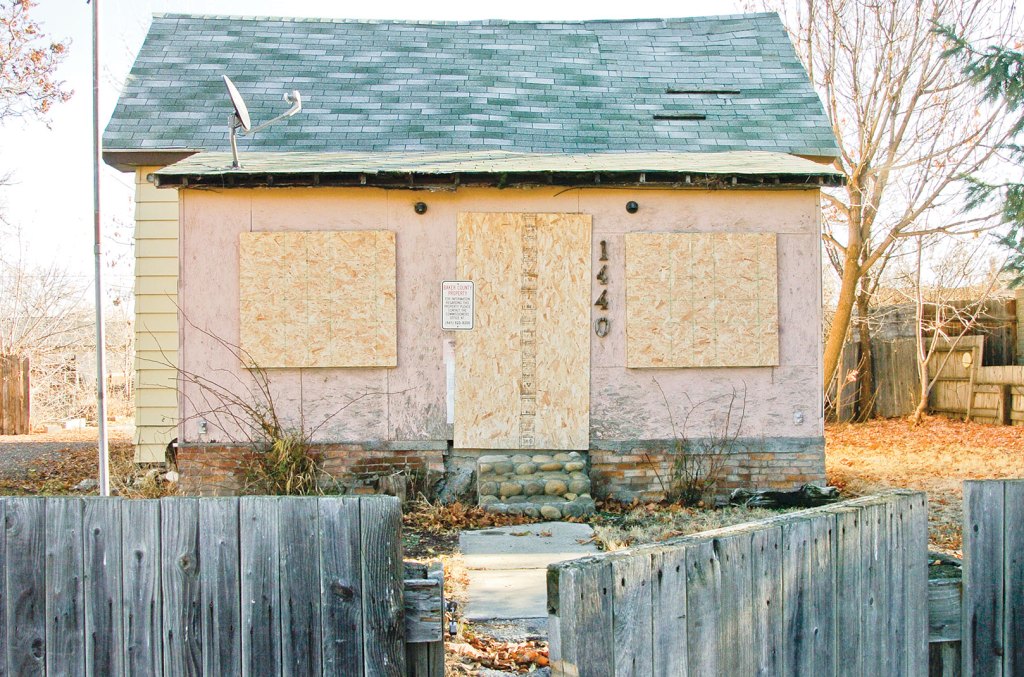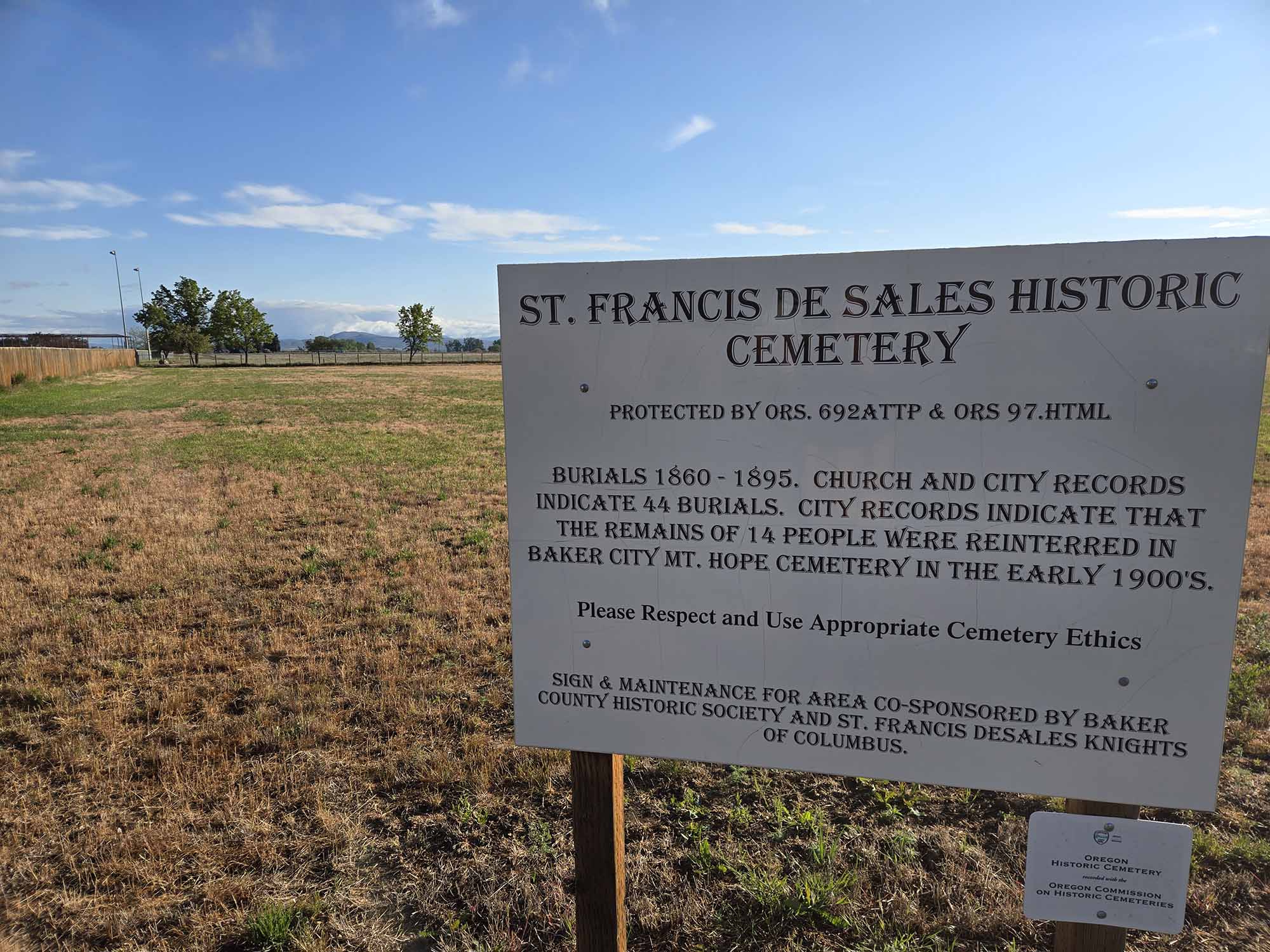Problem Properties
Published 7:30 am Thursday, November 16, 2017

- S. John Collins/Baker City HeraldA neighbor had frequently complained about activities at this house at 1440 13th St. Police arrested the woman living there on drug charges in 2016. Baker County later acquired the home because the property taxes weren’t paid. Police Chief Wyn Lohner said the chronic criminal activities that happened at the house are an example of the types of situations he hopes to avoid if the City Council passes an ordinance giving the city the authority to seek court orders banning access to properties that have repeated issues over a six-month period. City councilors tabled the proposed ordinance Tuesday.
The Baker City Council on Tuesday tabled discussion on a controversial proposed ordinance that would allow the city to seek court orders blocking all access, including by the owner, to residential properties with repeated criminal or property maintenance issues within six months.
Trending
About 20 people attended the meeting, and several told councilors they oppose the “chronic disorderly property” ordinance that Police Chief Wyn Lohner has proposed.
Ordinance 3361 defines as chronic disorderly a residential property where at least three arrests for certain crimes (see list on Page 2A), or violations of the city’s property maintenance or animal regulations codes, happen within a six-month period.
The ordinance would require the city to notify in writing the owners of any properties with at least two such issues within six months.
Trending
The city would not have the authority to unilaterally block access to a property. It would have to seek an order in Baker Justice Court. The ordinance states that properties would be closed to access for at least three months but not longer than a year.
Before councilors heard from the public, Lohner said the purpose of the ordinance is to address properties where there are repeated crime or city code violations, for which the current remedies aren’t effective.
He said he proposed the ordinance, which is nearly identical to one from Springfield, Oregon, after receiving numerous complaints over the years from neighbors about properties that have recurring crime and drug issues as well as code violations.
Lohner mentioned a home at 1440 13th St.
“We ended up with numerous complaints on it,” he said. “We had drug activity … we had property maintenance issues, health and sanitation issues. We had a myriad of other animal issues … It had the whole neighborhood up in arms.”
A neighbor who sent Lohner multiple emails about his concerns also included a copy of an ordinance from Tualatin that is similar to Springfield’s ordinance.
(See related story below.)
Lohner said he forwarded the Tualatin ordinance to the city’s attorney about two years ago, but never received a reply.
“It kind of got put on the back shelf,” he said. “We changed city attorneys. We spoke with City Manager (Fred) Warner and we took a look at it again and decided to go ahead and look at it from a livability standpoint and a community problem.”
Lohner noted that community livability is one of the City Council’s written goals.
“That’s what this addresses,” he said. “It wasn’t just that one property. We’ve had other ones in town … “It’s not for minor violations … It’s these places that are chronic problems where we have this multitude of activity … mixed with criminal activity and everything else. (The ordinance) is for the egregious cases.”
Lohner said his main goal with the ordinance would be to encourage property owners to deal with problems, not to frequently seek court orders restricting access to properties.
He said the Springfield police chief told him that city has closed only one home through its ordinance, but that the possibility of losing access to a property has made the ordinance an effective deterrent.
Lohner said the proposed ordinance gives property owners a chance to fix problems before the city would go to Justice Court. That would be the preferred result rather than seeking a court order, he said.
“Give us a plan on how you’re going to abate this,” Lohner said. “Then do it. Believe me (the police department) is not looking for more work. We’ve got plenty of work.”
Councilor Adam Nilsson cautioned his fellow councilors to seriously consider the potential effects of the proposed ordinance, which would give the city considerable power over the use of private property.
“It leaves little recourse for the person and a lot of flexibility to pick and choose who to go after,” Nilsson said.
Councilor Dan McQuisten said he understands Lohner’s point that the proposed ordinance was prompted by complaints from residents, and he agrees that the city needs to address chronic problems at individual properties.
But McQuisten said he has concerns about aspects of the ordinance.
“I don’t have enough information this evening to really make an informed decision,” he said.
Several Baker City residents, however, have already decided they don’t like the proposed ordinance.
Morgan Davis said it would unfairly target people.
“My property is probably one of the ones Mr. Lohner is talking about,” Davis said. “Instead of having help for people like me who can’t (clean up their property) you guys want to kick me out of my home?”
Davis said just because she has junk on her property doesn’t mean she has a meth lab in her barn. She said the ordinance might make sense for a larger city but it’s not appropriate for Baker City.
Joni Miner, who is disabled, said she understands the need to deal with drugs and other crime issues, but she said she’s concerned the ordinance would target those who may have code violation issues because they are unable to maintain their property because they’re elderly or disabled.
“What comes next? Where does it stop?” she said.
Others in the audience echoed Miners concerns that the ordinance would focus on residents who can’t maintain their property.
Mae Corwin, who held a small sign that read “Police State,” said the ordinance will allow the city to get rid of what they don’t like.
Neighbor’s complaints helped prompt proposed ordinance
By Chris Collins
ccollins@bakercityherald.com
Pete Tabel is wholeheartedly in favor of a proposed ordinance put forth to the City Council Tuesday night by Police Chief Wyn Lohner.
In fact, Tabel promoted the plan to Lohner based on a similar ordinance from Tualatin.
Lohner’s proposed ordinance, which he modeled after one in use at Springfield, is similar to the Tualatin ordinance. It is aimed at getting the attention of people whose property is the site of repeated criminal activity or those who repeatedly refuse to comply with city ordinances requiring them to clean up their property or maintain control of their animals.
Tabel, 68, has lived next door to one such property for about the past 20 years. He moved to Baker City from Philadelphia in search of a slower pace of life and worked as a carpenter until about five years ago. He retired because of health issues and that’s when he really began to realize how bad the problem with his next-door neighbors had become.
Tabel said his house at 1406 13th St. was a fixer-upper when he bought it. He began using his carpentry skills to make improvements.
In the beginning, his neighbors didn’t keep their property particularly neat, but that was a far cry from the problems that came in later years when the older property owners died or moved and their children took over the property.
Nearly all of the issues addressed in the proposed ordinance the City Council tabled Tuesday have taken place at the now abandoned house at 1440 13th St., Tabel said.
He praised the efforts of Mark Powell, the city’s code enforcement officer, for his efforts to encourage Tabel’s neighbors to clean up the overflow of garbage and overgrown weeds and to remove the vicious dogs at the property. And he praised the diligence of Baker City Police to arrest drug users and drug traffickers at the property, but in many cases, they couldn’t do enough to make permanent changes until the county foreclosed and moved the owner off the property.
Ten years ago, before the recent problems began to accelerate, former residents at the house were convicted of child sex abuse charges, Tabel said.
And before the county took possession of the property, sewer and water services had been disconnected and those living on the property had used buckets in the basement as toilet facilities.
“It’s just been a nightmare,” Tabel said.
See more in the Nov. 15, 2017, issue of the Baker City Herald.








